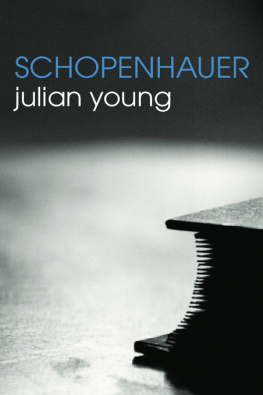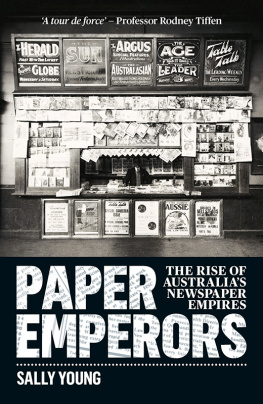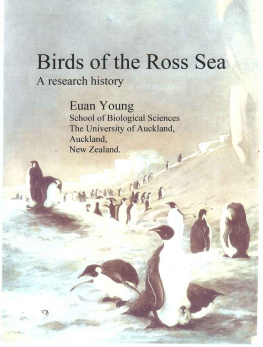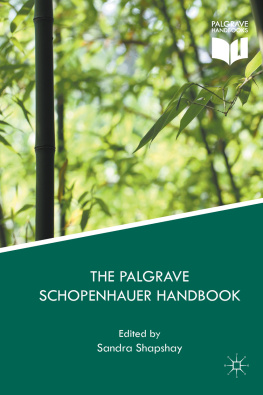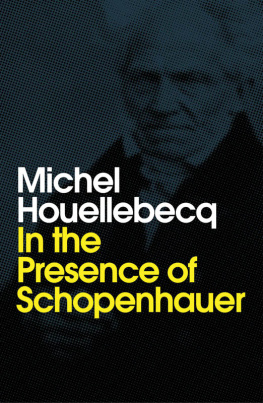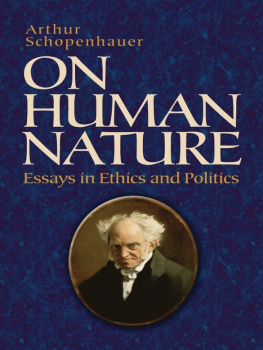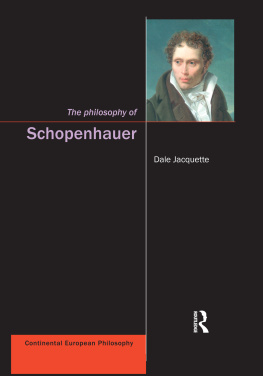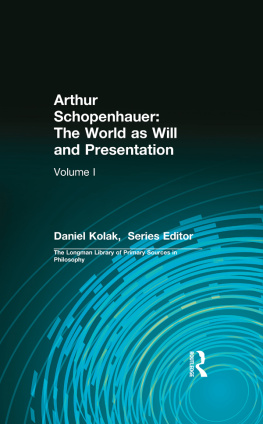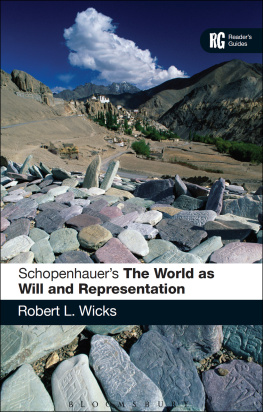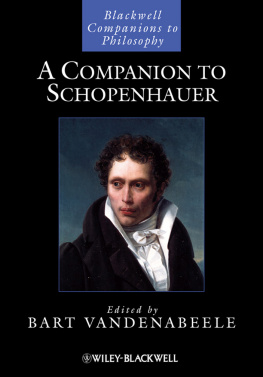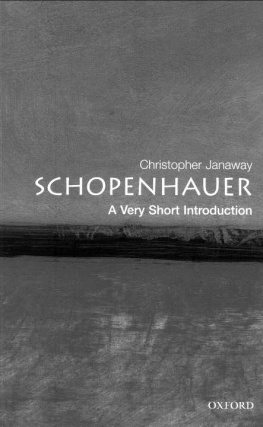
Schopenhauer
This is a comprehensive, sensible and lucidly presented account of Schopenhauers philosophy. The author succeeds in showing why Schopenhauer still deserves to be studied, but at the same time he is appropriately critical when discussing Schopenhauers doctrines and arguments.
Severin Schroeder, University of Oxford, UK
Routledge Philosophers
Edited by Brian Leiter
University of Texas, Austin
Routledge Philosophers is a major series of introductions to the great Western philosophers. Each book places a major philosopher or thinker in historical context, explains and assesses their key arguments, and considers their legacy. Additional features include a chronology of major dates and events, chapter summaries, annotated suggestions for further reading and a glossary of technical terms.
An ideal starting-point for those new to philosophy, they are also essential reading for those interested in the subject at any level.
| Hobbes | A. P. Martinich |
| Leibniz | Nicholas Jolley |
| Locke | E. J. Lowe |
| Hegel | Frederick Beiser |
| Rousseau | Nicholas Dent |
| Schopenhauer | Julian Young |
| Freud | Jonathan Lear |
| Forthcoming: |
| Spinoza | Michael Della Rocca |
| Hume | Don Garrett |
| Kant | Paul Guyer |
| Fichte and Schelling | Sebastian Gardner |
| Husserl | David Woodruff Smith |
| Rawls | Samuel Freeman |
Julian Young
Schopenhauer

First published 2005
2 Park Square, Milton Park, Abingdon, Oxon OX14 4RN
Simultaneously published in the USA and Canada
by Routledge
270 Madison Ave, New York, NY 10016
This edition published in the Taylor & Francis e-Library, 2005.
To purchase your own copy of this or any of Taylor & Francis or Routledges collection of thousands of eBooks please go to www.eBookstore.tandf.co.uk.
Routleddge is an imprint of the Taylor & Francis Group
2005 Julian Young
All rights reserved. No part of this book may be reprinted or reproduced or utilised in any form or by any electronic, mechanical, or other means, now known or hereafter invented, including photocopying and recording, or in any information storage or retrieval system, without permission in writing from the publishers.
British Library Cataloguing in Publication Data
A catalogue record for this book is available from the British Library
Library of Congress Cataloging in Publication Data
Young, Julian.
Schopenhauer / Julian Young.lst ed.
p. cm.(The Routledge philosophers)
1. Schopenhauer, Arthur, 17881860. I. Title. II. Series
B3148.Y67 2005
193dc22 2004017644
ISBN 0-203-02210-6 Master e-book ISBN
ISBN 0-41 5-33346-6 (hbk)
ISBN 0-41 5-33347-4 (pbk)
For Mary Montgomery
Acknowledgements
I should like to thank those who took part in my Auckland graduate seminar in the first semester of 2003 for a stimulating discussion of the substance of this book: in particular, Brignal Woods, Melanie Dougan, Tim MacKenzie and Mathias Mickl. Thanks are also due to my editor, Tony Bruce, and to the Routledge Philosophers series editor, Brian Leiter, for useful suggestions as to the structure of the work. The two (anonymous) readers of the manuscript saved me from various errors.
I am grateful, too, to the Deutscher Akademischer Austausch-dienst and to the University of Auckland for research grants which enabled me to visit the Schopenhauer Archive in Frankfurt am Main and to benefit from discussions with German colleagues in Bonn and Lneburg.
Finally I should like to thank Gnter Seubold and Christoph Jamme for those helpful and enjoyable discussions.
Abbreviations
The World as Will and Representation, vols I and II WR I, WR II
The Fourfold Root of the Principle of Sufficient Reason FR
On the Will in Nature WN
On the Basis of Morality BM
On the Freedom of the Will FW
Parerga and Paralipomena vols I and II PP I, PP II
Manuscript Remains vols IIV MR 14
Chronology
| 1632 | Spinoza born (dies 1677)
Locke born (dies 1704) |
| 1685 | Berkeley born (dies 1753) |
| 1717 | Hume born (dies 1776) |
| 1724 | Kant born (dies 1804) |
| 1749 | Goethe born (dies 1832) |
| 1762 | Fichte born (dies 1814) |
| 1770 | Hegel born (dies 1831) |
| 1775 | Schelling born (dies 1854) |
| 1781 | Kants Critique of Pure Reason appears. |
| 1788 | Arthur Schopenhauer is born. |
| 1793 | The Schopenhauer family move to Hamburg. |
| 1797 | Schopenhauer travels to Paris and Le Havre with his father.
Stays two years in Le Havre with family of business associate of his father. |
| 18034 | Grand tour of Holland, England, France, Switzerland, Austria. |
| 1804 | Apprenticed to merchant Kabrun in Danzig. |
| 1805 | Apprenticed to merchant Jenisch in Hamburg.
Apparent suicide of his father. |
| 1806 | Mother moves to Weimar. Goethe starts to visit her tea parties. |
| 1807 | Studies at grammar school in Gotha to obtain university entrance. |
| 180911 | University studies at Gttingen: natural science, Plato, Kant. |
| 181113 | University studies in Berlin. Attends lectures by Fichte, Schleiermacher, Wolf. |
| 1813 | Flees Berlin on account of war. Short stay in Weimar. Quarrels with mother, moves to nearby Rudolstadt where he writes his Ph. D. dissertation On the Fourfold Root of the Principle of Sufficient Reason. Conversation with Goethe in mothers house concerning theory of colours. Richard Wagner born (dies 1883). |
| 1814 | Schopenhauers final break with mother. Leaves Weimar for Dresden. |
| 1815 | On Seeing and Colours. Draft of first version of World as Will and Representation. |
| 1818 | World as Will and Representation published (though with 1819 on title page). Leaves Dresden for Italy. |
| 1820 | Lectures in Berlin. Hardly anyone turns up. |
| 1821 | Falls in love with singer Caroline Mdon. Beginning of the Marquet affair (assault on seamstress and suit for damages). |
| 182333 | Lives in Italy, Munich, Frankfurt, Mannheim, Dresden, Bad Gastein and Berlin. Tries and fails to establish himself as a translator. Illness, depression. |
| 1833 | Settles in Frankfurt, where he remains until the end of his life. |
| 1835 | On the Will in Nature |
| 1839 | Competition essay On the Freedom of the Will wins first prize. |
| 1840 | Competition essay On the Basis of Morality not awarded the prize even though only entry. Rude remarks about Hegel upset Hegelian judges. |
| 1844 | Second edition of World as Will and Representation appears, amplified by a second volume.
Nietzsche born (dies 1900) |
|
Next page
